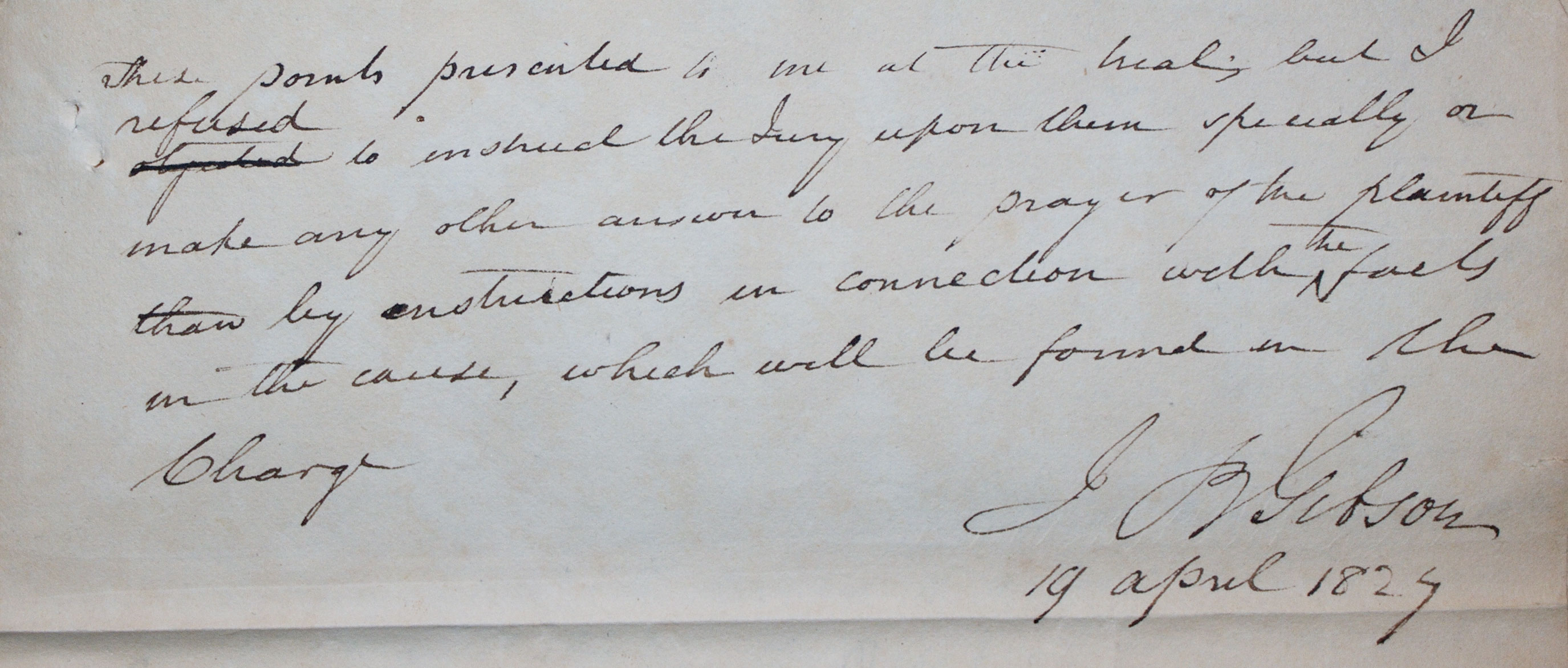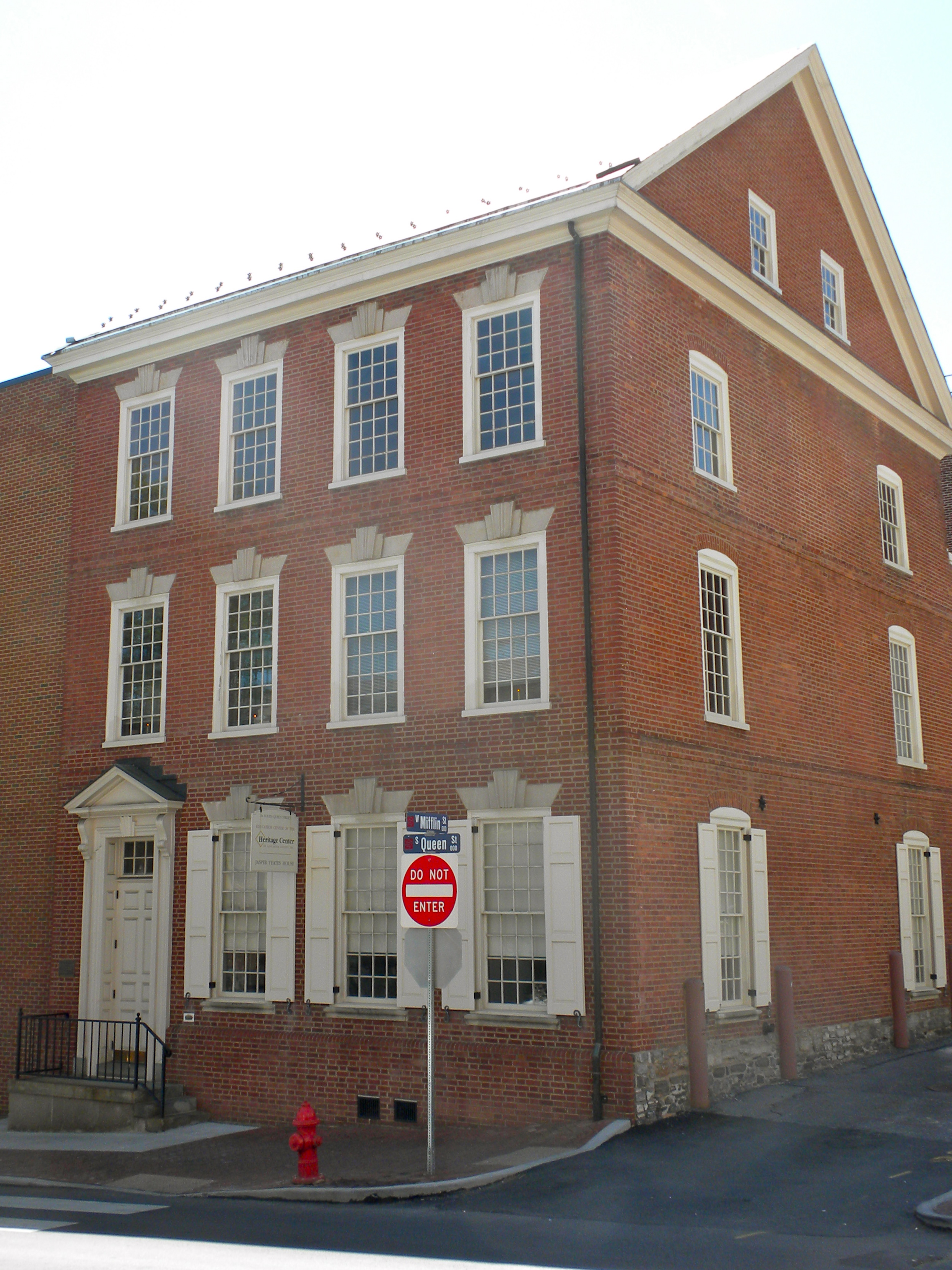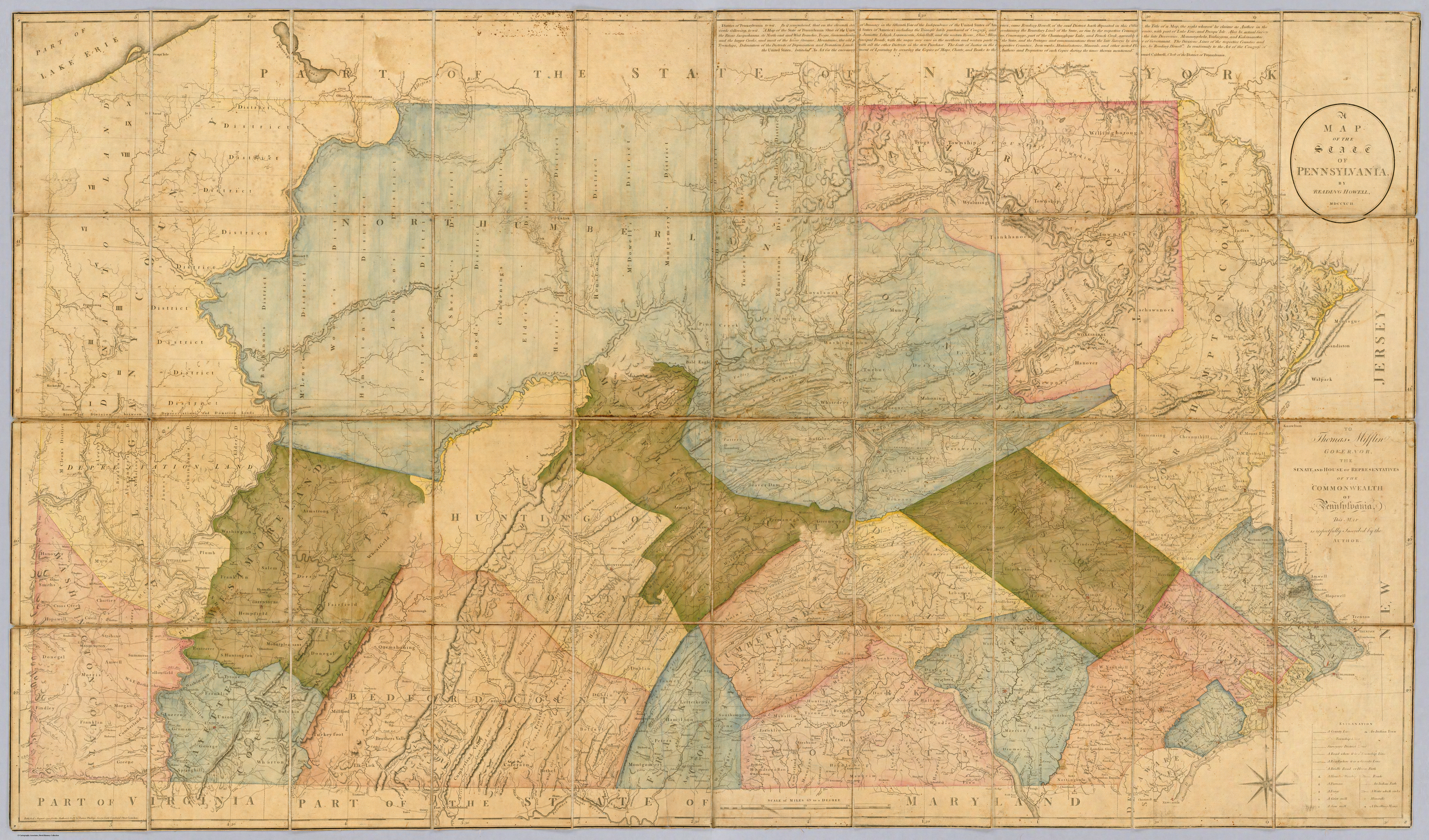|
John Bannister Gibson
John Bannister Gibson (November 8, 1780 – May 3, 1853) was a Pennsylvania attorney, politician in the state legislature, and judge, including years on the Pennsylvania Supreme Court from 1816 to his death in 1853. He served as chief justice on the court for 24 years. In 1821, Gibson was elected as a member of the American Philosophical Society. Early life Born in Perry County, Pennsylvania, Gibson was named for John Banister, a Virginia hero of the American Revolution. Gibson's father, George Gibson, also fought in the war and remained in service after its end. George Gibson was killed in an expedition to the Great Black Swamp in northwest Ohio during the Northwest Indian Wars, when Gibson was eleven years old. In 1795 or 1796, Gibson was sent to Dickinson College in Carlisle, Pennsylvania, where he remained about four years. Apparently Gibson did not take his degree, and the tradition is that he made very little mark as a student, though his latent abilities, or rather, his ... [...More Info...] [...Related Items...] OR: [Wikipedia] [Google] [Baidu] |
Jacob Eichholtz
Jacob Eichholtz (1776–1842) was an early American painter, known primarily for his portraits in the Romantic Victorian tradition. Born in Lancaster, Pennsylvania in a family of prosperous Pennsylvania Germans, he spent most of his professional life in Philadelphia. A coppersmith by trade, he turned to painting and achieved both recognition and success despite being mainly self-taught as an artist. He is known to have painted over 800 portraits over the course of 35 years. Hundreds of his works are housed in art museums, historical societies, and private collections throughout the United States. Early life He was born to Leonard and Catharine Eichholtz, who owned and run the ''Bull's Head Tavern'' on East King Street in Lancaster; his father took part in the American Revolutionary War. At age 11, Jacob with his brothers attended the English School at Franklin & Marshall College, Franklin College in Lancaster where he learned the three Rs — reading, 'riting and 'rithmetic. He al ... [...More Info...] [...Related Items...] OR: [Wikipedia] [Google] [Baidu] |
Hugh Brackenridge
Hugh Henry Brackenridge (1748June 25, 1816) was an American writer, lawyer, judge, and justice of the Supreme Court of Pennsylvania. A frontier citizen in Pittsburgh, Pennsylvania, United States, he founded both the Pittsburgh Academy, now the University of Pittsburgh, and the ''Pittsburgh Gazette'', still operating today as the ''Pittsburgh Post-Gazette''. Life Brackenridge was born in Campbeltown a small town on the Kintyre peninsula in Scotland. In 1753, when he was 5, his family emigrated to York County, Pennsylvania, near the Maryland border, then a frontier. At age 15 he was head of a free school in Maryland. At age 19 he entered the College of New Jersey, now Princeton University, where he joined Philip Morin Freneau, James Madison, and others in forming the American Whig Society to counter the conservative Cliosophic, or Tory, Society. (Today these are conjoined as the American Whig–Cliosophic Society.) Freneau and Brackenridge collaborated on a satire on American ma ... [...More Info...] [...Related Items...] OR: [Wikipedia] [Google] [Baidu] |
People From Perry County, Pennsylvania
A person ( : people) is a being that has certain capacities or attributes such as reason, morality, consciousness or self-consciousness, and being a part of a culturally established form of social relations such as kinship, ownership of property, or legal responsibility. The defining features of personhood and, consequently, what makes a person count as a person, differ widely among cultures and contexts. In addition to the question of personhood, of what makes a being count as a person to begin with, there are further questions about personal identity and self: both about what makes any particular person that particular person instead of another, and about what makes a person at one time the same person as they were or will be at another time despite any intervening changes. The plural form "people" is often used to refer to an entire nation or ethnic group (as in "a people"), and this was the original meaning of the word; it subsequently acquired its use as a plural form of ... [...More Info...] [...Related Items...] OR: [Wikipedia] [Google] [Baidu] |
1853 Deaths
Events January–March * January 6 – Florida Governor Thomas Brown signs legislation that provides public support for the new East Florida Seminary, leading to the establishment of the University of Florida. * January 8 – Taiping Rebellion: Zeng Guofan is ordered to assist the governor of Hunan in organising a militia force to search for local bandits. * January 12 – Taiping Rebellion: The Taiping army occupies Wuchang. * January 19 – Giuseppe Verdi's opera ''Il Trovatore'' premieres in performance at Teatro Apollo in Rome. * February 10 – Taiping Rebellion: Taiping forces assemble at Hanyang, Hankou, and Wuchang, for the march on Nanjing. * February 12 – The city of Puerto Montt is founded in the Reloncaví Sound, Chile. * February 22 – Washington University in St. Louis is founded as Eliot Seminary. * March – The clothing company Levi Strauss & Co. is founded in the United States. * March 4 – Inauguration of Franklin Pierce as 14th President of the U ... [...More Info...] [...Related Items...] OR: [Wikipedia] [Google] [Baidu] |
1780 Births
Year 178 ( CLXXVIII) was a common year starting on Wednesday (link will display the full calendar) of the Julian calendar. At the time, it was known as the Year of the Consulship of Scipio and Rufus (or, less frequently, year 931 ''Ab urbe condita''). The denomination 178 for this year has been used since the early medieval period, when the Anno Domini calendar era became the prevalent method in Europe for naming years. Events By place Roman Empire * Bruttia Crispina marries Commodus, and receives the title of '' Augusta''. * Emperor Marcus Aurelius and his son Commodus arrive at Carnuntum in Pannonia, and travel to the Danube to fight against the Marcomanni. Asia * Last (7th) year of ''Xiping'' era and start of ''Guanghe'' era of the Chinese Han Dynasty. * In India, the decline of the Kushan Empire begins. The Sassanides take over Central Asia. Religion * The Montanist heresy is condemned for the first time. Births * Lü Meng, Chinese general (d. 220) * Pen ... [...More Info...] [...Related Items...] OR: [Wikipedia] [Google] [Baidu] |
Pennsylvania Lawyers
Pennsylvania (; ( Pennsylvania Dutch: )), officially the Commonwealth of Pennsylvania, is a state spanning the Mid-Atlantic, Northeastern, Appalachian, and Great Lakes regions of the United States. It borders Delaware to its southeast, Maryland to its south, West Virginia to its southwest, Ohio to its west, Lake Erie and the Canadian province of Ontario to its northwest, New York to its north, and the Delaware River and New Jersey to its east. Pennsylvania is the fifth-most populous state in the nation with over 13 million residents as of 2020. It is the 33rd-largest state by area and ranks ninth among all states in population density. The southeastern Delaware Valley metropolitan area comprises and surrounds Philadelphia, the state's largest and nation's sixth most populous city. Another 2.37 million reside in Greater Pittsburgh in the southwest, centered around Pittsburgh, the state's second-largest and Western Pennsylvania's largest city. The state's subsequent f ... [...More Info...] [...Related Items...] OR: [Wikipedia] [Google] [Baidu] |
Justices Of The Supreme Court Of Pennsylvania
A judge is a person who presides over court proceedings, either alone or as a part of a panel of judges. A judge hears all the witnesses and any other evidence presented by the barristers or solicitors of the case, assesses the credibility and arguments of the parties, and then issues a ruling in the case based on their interpretation of the law and their own personal judgment. A judge is expected to conduct the trial impartially and, typically, in an open court. The powers, functions, method of appointment, discipline, and training of judges vary widely across different jurisdictions. In some jurisdictions, the judge's powers may be shared with a jury. In inquisitorial systems of criminal investigation, a judge might also be an examining magistrate. The presiding judge ensures that all court proceedings are lawful and orderly. Powers and functions The ultimate task of a judge is to settle a legal dispute in a final and publicly lawful manner in agreement with substantial ... [...More Info...] [...Related Items...] OR: [Wikipedia] [Google] [Baidu] |
Democratic Party (United States)
The Democratic Party is one of the two major contemporary political parties in the United States. Founded in 1828, it was predominantly built by Martin Van Buren, who assembled a wide cadre of politicians in every state behind war hero Andrew Jackson, making it the world's oldest active political party.M. Philip Lucas, "Martin Van Buren as Party Leader and at Andrew Jackson's Right Hand." in ''A Companion to the Antebellum Presidents 1837–1861'' (2014): 107–129."The Democratic Party, founded in 1828, is the world's oldest political party" states Its main political rival has been the Republican Party since the 1850s. The party is a big tent, and though it is often described as liberal, it is less ideologically uniform than the Republican Party (with major individuals within it frequently holding widely different political views) due to the broader list of unique voting blocs that compose it. The historical predecessor of the Democratic Party is considered to be th ... [...More Info...] [...Related Items...] OR: [Wikipedia] [Google] [Baidu] |
Joseph Ritner
Joseph Ritner (March 25, 1780 – October 16, 1869) was the eighth Governor of the commonwealth of Pennsylvania, and was a member of the Anti-Masonic Party. Elected Governor of Pennsylvania during the 1835 Pennsylvania gubernatorial election, he served from 1835 to 1839. Controversy surrounding his defeat in the 1838 Pennsylvania gubernatorial election sparked the Buckshot War. In 1856, Governor Ritner served as a delegate to the first Republican National Convention in Philadelphia. Early life Ritner was born in Reading, Pennsylvania on March 25, 1780. His parents were of German heritage, and Ritner was primarily self-educated, including learning to read and write in English, while also acquiring a working knowledge of German. He moved to Cumberland County as a teenager, where he worked as a farm hand and laborer until he purchased a farm of his own in Washington County. In 1801, Ritner married Susan Alter, and they were the parents of 10 children. The Washington County f ... [...More Info...] [...Related Items...] OR: [Wikipedia] [Google] [Baidu] |
Jasper Yeates
Jasper Yeates (1745–1817) was an American lawyer and judge from Pennsylvania, a justice of the state Supreme Court from 1791 to 1817. Early life and education Jasper Yeates was born in Philadelphia on April 9, 1745 to John and Elizabeth Sidebotham Yeates. He graduated from the College of Philadelphia with a Bachelor of Arts in 1758 and later received a Master of Arts degree. He studied law and was admitted to the Bar of Philadelphia in 1765. He traveled to England to study at the Inns of Court for his legal training, as was typical of other colonial aspiring families. His career began in Lancaster, Pennsylvania, west of Philadelphia where he became a prominent member of the bar. On December 30, 1767 he married Sarah Burd, eldest daughter of Colonel James Burd and his wife Sarah Shippen. During the American Revolution, he sided with the Patriot cause. In 1776, he served as a commissioner to investigate Native American affairs in Pittsburgh.Reuben G. Thwaites and Louise P. K ... [...More Info...] [...Related Items...] OR: [Wikipedia] [Google] [Baidu] |
Wilkes-Barre
Wilkes-Barre ( or ) is a city in the U.S. state of Pennsylvania and the county seat of Luzerne County. Located at the center of the Wyoming Valley in Northeastern Pennsylvania, it had a population of 44,328 in the 2020 census. It is the second-largest city, after Scranton, in the Scranton–Wilkes-Barre–Hazleton, PA Metropolitan Statistical Area, which had a population of 563,631 as of the 2010 census and is the fourth-largest metropolitan area in Pennsylvania after the Delaware Valley, Greater Pittsburgh, and the Lehigh Valley with an urban population of 401,884. Scranton/Wilkes-Barre is the cultural and economic center of a region called Northeastern Pennsylvania, which is home to over 1.3 million residents. Wilkes-Barre and the surrounding Wyoming Valley are framed by the Pocono Mountains to the east, the Endless Mountains to the north and west, and the Lehigh Valley to the south. The Susquehanna River flows through the center of the valley and defines the northwestern ... [...More Info...] [...Related Items...] OR: [Wikipedia] [Google] [Baidu] |
Simon Snyder
Simon Snyder (November 5, 1759November 9, 1819) was the third Governor of the Commonwealth of Pennsylvania, serving three terms from 1808 to 1817. He led the state through the War of 1812. Born in Lancaster, Pennsylvania, Snyder established a gristmill in Selinsgrove, Pennsylvania. He was elected as a Justice of the Peace and served as a delegate to the 1790 Pennsylvania constitutional convention. He served in the Pennsylvania House of Representatives from 1797 to 1807, and won election as Speaker of the House. A member of the Democratic-Republican Party, he ran for governor in 1805 but was defeated by Thomas McKean. He won election as governor in 1808 and won re-election in 1811 and 1814. He was the first governor elected in Pennsylvania who was of German descent, and was also the first governor of Pennsylvania to issue a Thanksgiving Proclamation. Snyder presided over the establishment of Harrisburg as the state capital. He strongly supported the War of 1812 and was a ca ... [...More Info...] [...Related Items...] OR: [Wikipedia] [Google] [Baidu] |

_1938.jpg)



